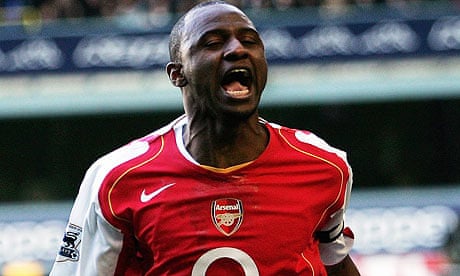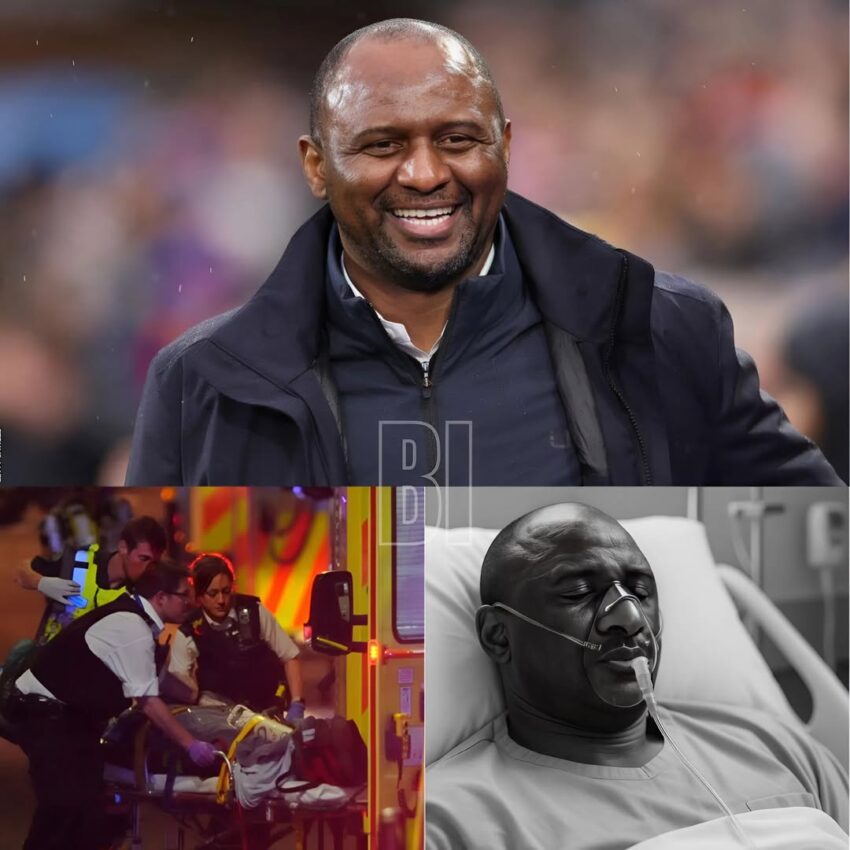In heartbreaking news that has left the football world reeling, the family of Arsenal and French legend Patrick Vieira announced just 30 minutes ago that, at the age of 49, after many years of battling a terrible illness, he has finally stepped away from the public spotlight forever. The announcement did not come in the form of an elaborate press conference or carefully orchestrated media event, but rather a deeply emotional family statement that reflected the pain, exhaustion, and gratitude of those who stood by his side during the darkest years of his life.
For millions of fans across the globe, Patrick Vieira was not just a football player. He was the heartbeat of Arsenal’s “Invincibles” era, the captain whose commanding presence defined the midfield and instilled fear in opponents. For the French national team, he was a world champion, lifting the FIFA World Cup in 1998 and later the UEFA European Championship in 2000. His legacy as one of football’s greatest leaders seemed untouchable—until the cruel reality of illness began to strip away the strength that once made him immortal on the pitch.

The family’s message, delivered through close friends and shared discreetly with the media, revealed that Vieira’s fight had been long and grueling. For years, he had chosen to keep his condition private, not wanting to overshadow the game he loved or to draw unnecessary pity. Instead, he showed up at events, interviews, and matches with a brave face, hiding the pain that only those closest to him could truly see.
“Patrick never wanted to be remembered for his illness,” one family friend explained. “He wanted to be remembered for his strength, his leadership, and the joy he brought to millions of fans. But the truth is, what he endured in these past years only makes his legacy even greater.”
News of the announcement has already sent shockwaves across the football community. Social media flooded with tributes from fans, players, and clubs alike. Arsenal, the club where Vieira cemented his place in history, shared a somber message:
“Patrick Vieira will always remain one of our greatest captains, a leader who defined an era. His courage both on and off the pitch is something we will never forget.”
Former teammates, from Thierry Henry to Robert Pirès, echoed these sentiments. Henry, visibly shaken when contacted by reporters, described Vieira as “the brother who always protected me, both on and off the field. It’s impossible to imagine football without his voice, his presence, his leadership.”

Beyond the statistics and the trophies, Vieira’s impact stretched far deeper. For many young players of African descent, he was more than a football star—he was a symbol of what was possible. Born in Senegal before moving to France, Vieira overcame obstacles of identity, migration, and expectation to rise to the very peak of global football. His story inspired countless others who looked at him and saw a path forward, a reason to believe that dreams could be achieved despite hardship.
What makes today’s announcement even more devastating is the sense of unfinished business. Vieira had transitioned into management, coaching clubs like New York City FC, Nice, and Crystal Palace, showing the same intensity and vision he once brought as a player. Many believed it was only a matter of time before he would return to Arsenal in a leadership role or even manage the French national team. Those dreams, like so many others, now fade into uncertainty with this tragic revelation.
The illness that claimed Vieira’s strength was described by those close to him as “relentless and unforgiving.” While the family has not publicly disclosed the exact condition, sources say it was a long-term disease that slowly weakened his body, forcing him into repeated treatments and hospital stays. Despite this, Vieira never lost the will to fight.

His family’s statement ended with a message of gratitude:
“Patrick gave everything to football, but what many do not know is how much football gave to him. To the fans, the clubs, and the teammates who stood with him throughout his journey, we thank you. Patrick’s battle may have ended, but his legacy will live forever.”
As fans gather outside Arsenal’s Emirates Stadium to leave flowers, scarves, and heartfelt notes, the weight of loss is palpable. The chants of “Vieira, Vieira” that once echoed through Highbury and across Europe now carry a deeper, sorrowful resonance.
This sad day is not just about losing a football hero—it is about saying goodbye to a man whose resilience, leadership, and courage both on and off the field will remain etched in history.
For Arsenal supporters, for France, and for football itself, Patrick Vieira’s name will never fade.
